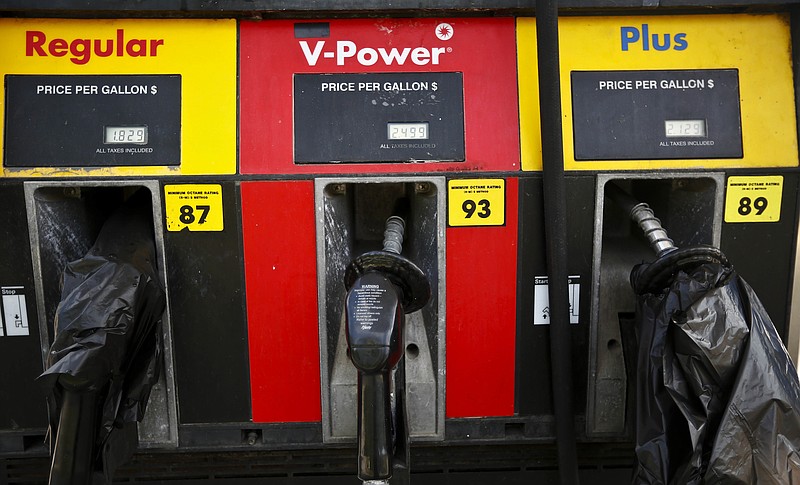Haslam’s gas tax plan
Proposal: Hike gasoline and other vehicle-related taxes to raise $278.5 million a year for highway and bridge construction and improvementHow much: 7 cents for gasoline, 12 cents for diesel, $5 to $20 increase in registration fees, $100 fee on electric vehicles and new tax on natural-gas fueled vehiclesWhat for: Backlog of nearly 1,000 bridge and highway improvements worth $6 billion plus funding for new projectsLocal share: $78 million for counties, $39 million for citiesSource: Governor’s office
NASHVILLE - As he seeks additional money for roads through proposed increases on fuel taxes, Republican Gov. Bill Haslam is discovering he's also started an increasingly bipartisan and populist conversation about tax fairness in Tennessee.
The Republican governor's IMPROVE Act seeks to raise the tax on gas and diesel to help the state tackle a projected backlog of $10.5 billion in highway and bridge projects.
That and other increases in areas such as vehicle registration fees brings the total increases for the dedicated highway fund up to $278.5 million annually.
At the same time, recognizing that the state has huge surpluses in non-highway taxes that support general government functions like education and prisons, Haslam has proposed cutting three taxes by $270 million, including reducing the state's 5 percent sales tax on food by a half percentage point or $55 million.
The bulk of the cuts go to manufacturers and toward accelerating an already approved phase-out of the Hall tax on investment and dividend income for the estimated 175,000 Tennesseans who pay it.
That's generating concerns not only among Democrats but a growing number of Republicans who are eyeing the impact of the gas tax increases on their working or middle class constituents who wouldn't get at least an equal amount of tax relief elsewhere.
Tennessee is consistently ranked among the states where poor and middle-class taxpayers pay the largest share of their income compared to wealthier individuals.
There's debate on whether that's fair or not, with proponents arguing that wealthier people often pay more taxes and critics decrying the burden on those not as fortunate to bear it as easily.
"I don't see how you justify doing a gas tax increase unless there's at least a net even decrease for people that pay the increase - working and poor people," said Rep. Gerald McCormick, R-Chattanooga, the former House majority leader who now heads the chamber's Budget Subcommittee.
McCormick said he believes Haslam is right when he argues the $113 million in cuts for manufacturers will generate jobs.
"But," McCormick added, "[people] also want to get their $10 a month or whatever it is, and it's only fair that they do, even if it's not a huge amount of money."
McCormick favors deeper cuts in the state's sales tax on groceries. Democrats are calling on phasing it out completely, which would cost the state about a half billion dollars annually.
Haslam's current proposal of a half a percentage point reduction would amount to 50 cents savings on $100 worth of groceries.
And he says his proposed fuel tax increases would cost the average motorist about $4 more per month.
With a number of Republicans balking over the fuel-tax increase recommendation, GOP critics earlier this week sought to divert a quarter percentage point of existing sales taxes from the general fund to the highway fund and leave Haslam's proposal in the dust.
But the move collapsed in the House Transportation Subcommittee when Rep. John Mark Windle, R-Livingston, who favors deeper cuts in the grocery tax, offered an amendment to take the sales tax off of baby formula entirely. Chairman Terri Lynn Weaver, R-Lancaster, rejected it as out of order.
Windle responded by successfully moving to adjourn the eight-member panel until next week.
Following Thursday's townhall meeting in Algood, Haslam told reporters that the $4 average fuel tax is "less than a dollar a week" for most people. He later added that "if we were proposing something that raises it 50 cents [per gallon], that would be a different feel."
The governor also noted that the Hall income tax was enshrined in statute "and we've got to take it out of the budget in the next six years." While he said he could "just ignore" that since he leaves office in January 2019 "that's not the right thing to do."
As for cutting corporate taxes for manufacturers, Haslam said that is "one we really need to do" because Tennessee is ranked as high as No. 3 among states on corporate taxes.
"We're going to lose opportunity and jobs if we don't address that," he said.
But concerns raised by McCormick, Windle and others appear to be spreading about the fairness issue to millions of Tennesseans.
House Republican Caucus Chairman Ryan Williams of Cookeville told The Associated Press "there is a concern among many in the caucus that if we're going to effectively raise a use fee on working Tennesseans that it needs, the tax cut should be directly relational to them. And it should be deeper than the user fee increase. There's no doubt there's a way to do that. The questions is, will we ever get to it?"
"Hopefully this General Assembly can find a solution to fix a long-term transportation funding program," Williams added. "If we don't, you won't see us discuss it for probably another five to eight years."
Contact Andy Sher at asher@timesfreepress.com or 615-255-0550. Follow him on Twitter @AndySher1.
